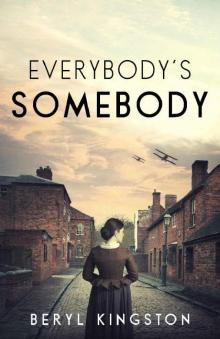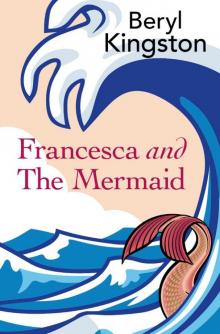- Home
- Beryl Kingston
Avalanche of Daisies
Avalanche of Daisies Read online
AVALANCHE OF DAISIES
Beryl Kingston
When George Bernard Shaw got married, reporters asked him his opinion of married life. He replied that he and his wife, being middle-aged and childless couldn’t possibly know anything about it.
‘Real married life,’ he said, ‘is the life of the boy and girl who pluck a daisy and bring down an avalanche on their shoulders.’
I dedicate this book to the young couples who married in the late thirties and early forties as a tribute to their courage and endurance, for the avalanche that fell on their shoulders was the Second World War.
Contents
Chapter One
Chapter Two
Chapter Three
Chapter Four
Chapter Five
Chapter Six
Chapter Seven
Chapter Eight
Chapter Nine
Chapter Ten
Chapter Eleven
Chapter Twelve
Chapter Thirteen
Chapter Fourteen
Chapter Fifteen
Chapter Sixteen
Chapter Seventeen
Chapter Eighteen
Chapter Nineteen
Chapter Twenty
Chapter Twenty-One
Chapter Twenty-Two
Chapter Twenty-Three
Chapter Twenty-Four
Chapter Twenty-Five
Chapter Twenty-Six
Chapter Twenty-Seven
Chapter Twenty-Eight
Chapter Twenty-Nine
Chapter Thirty
Chapter Thirty-One
Chapter Thirty-Two
Chapter Thirty-Three
Chapter Thirty-Four
Chapter Thirty-Five
A Note on the Author
Chapter One
We were waiting. All of us. All over the country. All across Europe and the United States. Soldiers, sailors, airmen – and civilians too because we were all involved in this war – from the arsenals of California to the battlefields of Kiev and Leningrad, from the bomb-sites of London to the terrible, secret torture-chambers of Belsen and Buchenwald. There had never been such a wait. It was almost as if our lives had been temporarily suspended. We were hanging on, that’s how it was, from one month to the next, our minds focused towards one, long-desired, meticulously planned, all-important, much-dreaded event – the Allied invasion of Europe that we called the Second Front.
The war had been dragging on for more than four years and we all knew it wouldn’t stop until the Germans had been driven out of occupied Europe. We knew what it would cost too, that thousands of young men would be killed in the fighting before it was over. But now it was the beginning of 1944, the plans were complete and the invasion was coming no matter what our feelings about it might be. The signs were all there. There were US bases all over south-east England; military convoys roared along the main roads everywhere you looked; equipment and supplies arrived by the day to stand in the fields in long, reassuring rows; and, to cap it all, the famous Desert Rats had been brought back from Italy and were billeted in Norfolk waiting to lead the invasion and strike terror into their old enemies.
The Desert Rats! What extraordinary men they were! It lifted our morale just to see them, with their tough brown faces and their foreign slang and the Africa Star brave on their battledress, victors of Tobruk and El Alamein, the men who’d defeated the invincible Rommel and seen off the dreaded Afrika Korps, heroes to a man. They had a wonderful disregard for petty rules and seemed to be able to wear whatever they fancied, silk scarves, gaudy pullovers, corduroy trousers, even suede shoes, which they claimed were ‘scuffed by the sands of the desert’. And why not? Knowing what lay ahead of them. Within days of their return they came swaggering into the local towns and took possession, laying claim to all the pubs, cinemas, dancehalls and women that were most desirable.
The nineteen-year-olds, like Steve Wilkins and his oppo Dusty Miller, who’d been sent to replace the men who’d been killed in the Italian campaign, were mere boys compared to them – and they knew it and looked it. They had a rough time in such company, for although they would soon be facing the same dangers as the rest of the army, for the moment they were scorned for their youth and inexperience, mocked for their pale faces and white knees and advised to ‘get some in’ whenever they made mistakes. Most of them kept their heads down and accepted being ribbed as the price they had to pay for being part of such a famous army. For as Steve said, ‘If I’ve got to fight, I’d rather fight in their army than anyone else’s. They know what they’re doing.’ Only a few, like Dusty, who was small and quick-tempered, took their teasing personally. As he did that Saturday night.
‘Bloody sergeant!’ he growled, kicking into the Nissan hut in his army boots and trousers. It was mid February and very cold, so his dash across the compound from Ablutions had brought him out in goose-pimples. He had a towel draped round his neck but that was more for decoration than warmth and his chest was blotched pink from the combination of night air and quick scrub. He shivered into his vest and shirt, frotting the khaki cloth against his arms to warm them. ‘I can’t help havin’ a white skin! To hear him goin’ on all the time, you’d think I done it on purpose.’
‘But you’re lovely with it!’ Steve said. ‘I mean to say, look at you. Clark Gable in khaki! You’ve got the same ears. You going dancing in your boots?’ Unlike the old hands, he had the knack of teasing to soothe.
‘Don’t you start!’ Dusty grinned. ‘I got enough with Shit-Features. It’s all very well for you, lying there. I suppose you’re gonna say you’re ready.’
The hut was a swarm of preening activity and clouded with cigarette smoke as the other twenty-two men who lived there prepared for their night on the town, struggling into shirts and tunics, polishing shoes, anointing hair with brilliantine, squeezing spots, fighting to admire themselves in their one small pockmarked mirror. But Private Steve Wilkins wasn’t part of it. He lay sprawled on his bed, peacefully reading, with the book balanced on his tunic.
‘I don’t take all night tarting myself up,’ he said amiably.
Although he’d only been with the 7th Armoured for a few weeks, his calm was already legendary. His appearance could easily have singled him out for special teasing – for he was a very noticeable young man, over six foot, slim and long-legged with auburn hair, large brown eyes and a very handsome face – but it didn’t. Composure is invaluable in wartime, as soldiers are quick to discover, and a man whose self-control actually increases under stress is a rare breed. His mates were already calling him ‘old Steve’ and passing on tales of his dependability. And that, combined with a touching innocence, an occasional other-worldliness and a complete lack of vanity, was enough to shield him from the taunts of the old hands and to make him something of a thing apart among the newcomers. The way he prepared for a night out was typical of him – wash, dress, run a quick comb through his hair, and he was ready.
Dusty snorted in mock disapproval. ‘You won’t get yerself a bint if you don’t make an effort. I’ll tell you that for nothing.’
Steve shrugged and grinned. ‘I’m easy,’ he said. He didn’t particularly want to ‘get himself a bint’. The very word put him off. It sounded coarse and cheap, like ‘a bit on the side’ or ‘a bit of skirt,’ the sort of girl you picked up, went as far as you could with and then dumped. If a bint was all they were after, good luck to them. Privately, he knew he wanted a great deal more than that. But he had to accept that he was too shy for all the chatting-up you had to do to get any girl interested in you in the first place. Too shy and too ignorant. He hadn’t learnt how to flirt, that was part of it, and flattery had always seemed dishonest and rather despicable.
H
e turned a page, deciding, yet again, that he would wait until the right girl came along. He’d find her somehow. He had no idea how or where but two things were certain – it wouldn’t be until the war was over, because it wouldn’t be fair to get involved and then shoot off and leave her; and it wouldn’t be in a dancehall. The one they were going to that night was no better or worse than the others. It would be entertaining there. It would pass the time. But it was just a dancehall. Not worth getting into a lather about.
In fact the Saturday hop at King’s Lynn was held in the Corn Exchange, which was a prestigious place had anyone stopped to consider it. But nobody did. The locals were too used to it, the soldiers were too busy looking for talent, and it was always much too crowded. It had been crowded even before the Desert Rats moved into the area and now there were suddenly three times the number of men about and most of them were soldiers. The local girls were thrilled by their sudden popularity but the local lads were put out in every sense of the word. Unless they were already comfortably attached to the girl of their choice, they mooched in and out of the hall in disgruntled gangs trying to appear nonchalant and scowling at their adversaries. There were three of them glowering at the entrance when Steve and his mates strolled in.
‘Punch-up?’ Dusty said hopefully. He was still angry from his brush with the sergeant and a scrap was just what he needed.
Steve glanced round the hall. Hordes of girls might make him feel ill at ease but he enjoyed a brawl. As a schoolboy he’d been in enough street fights to know what to expect. It gave him a chance to use his height and strength and he liked the sense of being part of this invincible army. But there was no likelihood of any trouble that night. There were Desert Rats everywhere he looked and three locals were hardly likely to provoke trouble with that sort of opposition about. ‘No,’ he said. ‘Don’t think so.’
‘Pity,’ Dusty grimaced. ‘I could’ve taken them on, no trouble.’ He pulled a cigarette from Steve’s proffered packet, lit it and began to size up the talent. ‘Boy, oh boy. Get an eyeful a’ that!’
That was a dark-haired girl in a red sweater and navy-blue trousers who was doing an energetic jitterbug with a languid GI. To Steve’s eyes, she wasn’t a particularly pretty girl but she was certainly vivacious. Her hair swirled as she danced, her feet leapt, her breasts bounced. Now they were pretty. Soft and full and tiptilted and …
‘Boy, oh boy!’ Dusty groaned. ‘Will you look at that redhead!’
‘There’s fickle you are!’ Taffy Jones yelled at him above the noise of the band. ‘I thought you was after the sweater gel.’
‘You know me,’ Dusty shouted back. ‘Play the field, me.’ He went on enjoying the sights on offer, smoking happily. By the time the jitterbug crashed to an end, he’d decided on four possibilities. He said, ‘Tally ho!’ to Steve, stubbed out his cigarette and plunged into the hunt. The next dance was a waltz so the lights were turned down as he moved and the silver mirror ball set spinning above his head. Soon he was lost in the swirl.
This was the moment in any dance that Steve enjoyed the most, when he could stand with his back against the wall, have a quiet smoke, dream vague dreams and watch without having to be involved. The waltz was soothing. It reminded him of the wireless back home, Dad mending shoes by the fireside, nails between his lips, Mum darning, her work-basket open beside her, the smell of home-cooking … What wouldn’t he give for a plate of her bacon and eggs! Or bacon and tomatoes. Or just fried bread.
Soft light and drifting music gentled the hall. The dancing couples gyrated dreamily beneath the long beams spinning from the mirror ball. Discs of white light dappled their shadowy faces. The obscenity of bombs and bullets was a long way away.
One day, Steve promised himself, with a bit of luck, when I know a bit more, when this war’s over, if I’m still in one piece, I shall have a girl and we’ll dance like that, cheek to cheek. The words of the song filled his mind with hope. ‘I’ll be loving you. Always. With a love that’s true. Always. When the things you’ve planned need a helping hand …’
At that moment, there was a commotion on the other side of the hall, somebody being pulled off the floor by the looks of it, somebody shouting, arms waving. Dusty appeared at his side as if by magic.
‘Now that’s a punch-up,’ he said, eyes gleaming. He cracked his knuckles, crick-crack, left hand, right hand, like a boxer flexing his muscles. ‘Let’s have a shufti.’
The rest of the gang had gathered round him too, all eager. ‘Yeh! Come on! Let’s.’
They pushed their way through the crowd, shouldering people aside, avid for action. But it wasn’t yobs versus the army after all, just one of the local lads shoving a girl about. Dusty was visibly disappointed.
The lad was a stocky-looking individual about three inches shorter than Steve, dark of hair and eye, with brawny arms and big hands that he was using with unnecessary force to push the girl backwards away from the dance floor. She was fighting him off valiantly, twisting her body out of his reach and shouting at him to leave off, but he was too heavy for her and too insistent.
‘You came here with me,’ he shouted, pushing at her again. The words rose into the languid sounds of the waltz, staccato as bullets.
‘No I didn’t,’ she shouted back. ‘I come on my own.’
‘You’re my gal,’ he insisted. ‘My gal … so you dance with me, properly, or you go home. You’ll get yourself a reputation.’
‘I don’ care!’
‘Well I do!’
The girl kicked out at him viciously, catching him on the shins, so that for a second he staggered back, temporarily off guard. ‘You don’ own me, Victor Castlemain,’ she said. ‘I hain’t your gal an’ thass no good you think it. Don’t talk squit!’
Kicking him made him worse. He seized her by the shoulders and shoved her against the wall, his handsome face dark with rage. ‘All this hossin’ around has got to stop. Do you hear me?’
No, Steve thought, this is too much. I can’t let this go on. Even in the heat of her anger, there was something vulnerable about this girl, something about the expression in her eyes, the tilt of her chin, the way she stood her ground. It roused him to an instant and protective tenderness. She was too small to fight a great gawk like that. Too small and too skinny, her wrists fragile against the brute fists of her aggressor. Without thinking any further, he stepped forward to defend her.
‘That’ll do,’ he said to the gawk. ‘Leave her be.’
The young man barely looked at him. ‘Buzz off, soldier!’ he said. ‘That’s nothing to do with you. That’s between me an’ her.’
‘I don’t think so,’ Steve said, putting his height and strength between them.
For a prickling second, the two men bristled at one another, challenging, eye to eye, Steve using his height to intimidate, the other standing four square, jutting his chin. Then the young man spoke again. ‘Buzz off!’ he warned. ‘I told you. This is private.’
‘In a public dancehall?’ Steve mocked. ‘Oh I don’t think so. Anyway, she’s dancing with me.’ He turned to the girl. ‘Aren’t you?’
She looked straight up at him, and now she had a devilish expression on her face. Daring? Delight? He couldn’t interpret. ‘Thass right,’ she said, and held out her hand to him.
The young man scowled at her. ‘You’re not. Don’t be stupid.’
‘She is,’ Steve told him, taking her hand and leading her away from trouble. ‘D’you want to make something of it?’
Now, and a bit late, the young man realised that he was surrounded by hostile khaki. ‘Now look here,’ he said.
Dusty moved happily into the attack, fists clenched. ‘No, you look, sunshine,’ he said, thrusting his face at his enemy. ‘Seems to me you need to cool down.’ Steve and the girl were already dancing their way towards the centre of the floor. ‘Seems to me you need to take a little walk. Bit a’ fresh air. Whatcher think fellers?’
‘You can buzz off too!’ the young man said, standing his ground
. ‘I’m not going anywhere and you can’t make me.’
They had his arms pinioned behind his back before the words were out of his mouth.
‘D’you wanna bet?’ Dusty mocked as they shoved him forwards.
Out on the dance floor the girl was laughing, her face transformed, cheeks rounded, eyes gleaming, lips spread wide, small teeth catching the light. ‘I shouldn’t laugh,’ she said, ‘but you got to admit thass funny. He onny start hollerin’ because a’ me dancing with someone he knew. Thass what start it. And now I’m with you an’ I don’t know you from Adam. You got to admit …’ Laughter overwhelmed her.
‘I’m Steve,’ he told her, adding with some pride, ‘Private Steve Wilkins, 7th Armoured Division.’
‘I can see that,’ she said, looking at the divisional badge on his shoulder. ‘I’m Barbara.’
Two other dancers nudged past them and the girl reached out to pull at Barbara’s red sweater. ‘Lo Spitfire!’ she said. ‘What was all the hollerin’?’
‘Onny Vic,’ Barbara told her easily. ‘You know the way he go on.’
The girl grimaced and was gone.
‘Spitfire?’ Steve asked.
‘Thass my nickname.’
‘Suits you,’ he said, admiring her. Small, quick, spitting fire, it was just the right name for her. Full of life and movement, like mercury. Now that they were so close to one another he could see how attractive she was, her features finer than most of the other girls in the hall. She had a funny little nose, like Bob Hope’s, but her eyes were large and almond shaped and shadowed by amazingly thick lashes and her mouth was quite the most delicious he’d ever seen, her top lip wide and lusciously curved, her bottom lip so full it was almost as if she was pouting. Then he noticed the red sweater and realised who she was. The jitterbug girl. Good God! I’m dancing with the jitterbug girl. Wonders’ll never cease.
‘I could have seen him off myself, you know,’ she said.
‘I don’t doubt it,’ he told her. With that bold face she could see anybody off.
‘I don’t need rescuing. Not really. I got three brothers. If I can cope with them I can cope with anyone.’

 Everybody's Somebody
Everybody's Somebody Sixpenny Stalls
Sixpenny Stalls Francesca and the Mermaid
Francesca and the Mermaid Avalanche of Daisies
Avalanche of Daisies Tuppenny Times
Tuppenny Times A Time to Love
A Time to Love Octavia's War
Octavia's War Gemma's Journey
Gemma's Journey London Pride
London Pride Gates of Paradise
Gates of Paradise Octavia
Octavia Off the Rails
Off the Rails Maggie's Boy
Maggie's Boy Fourpenny Flyer
Fourpenny Flyer